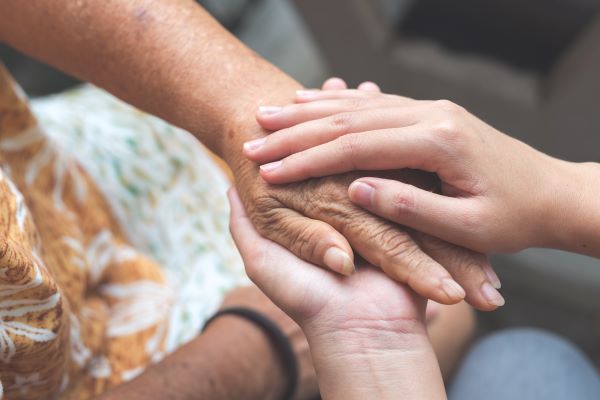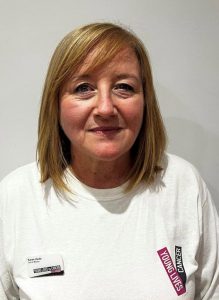
To some, at first glance, working in a hospice might seem a gloomy place to practise social work.
However, Wendy Ashton, joint education lead at the Association of Palliative Care Social Workers (APCSW), believes social work in palliative care is about celebrating life rather than focusing on death.
“This is proper social work, this is what I trained to do. I don’t mean that to be demeaning of any other social work but it is totally different,” she says.
Palliative care, usually given in a hospice, hospital or at home, is offered to those who are terminally ill, in order to improve their quality of life.
Ashton, who won the Making a Difference gong at the Social Worker of the Year Awards in 2018, has worked in a hospice for 13 years. She manages the social work, counselling and spiritual care teams as well as doing frontline work.

The Social Worker of the Year awards 2018
People come to the hospice after receiving a palliative care diagnosis. This could be due to cancer, respiratory or heart failure or any other terminal illness. They can then choose to stay at a hospice (dependent on waiting lists), either for a short duration before going home, or for the remaining period of their life.
Hospices are partially funded by the NHS, with the rest coming from charitable donations. The leading hospice charity, Hospice UK, supports 200 hospices that serve over 300,000 people, both children and adults.
The social work role
Like other branches of social work, palliative care social work has many strands to it. A social worker’s role includes, but is not limited to, giving advice, carrying out assessments, discharge planning, advance care planning (for example, regarding legal matters, wills and funerals) as well as providing psychological, spiritual and emotional support.
Marie Price, also joint education lead at the APCSW, has worked in hospices for more than 30 years and would like to see more social workers explore palliative care. As a social work lecturer she helps arrange placements for students at hospices.

Marie Price
“Social workers can do social work in hospices in a way that they can’t always in statutory work. It’s kind of good relationship-based social work, which is a good start,” explains Price.
Another aspect to palliative care social work is offering bereavement support to partners and families of the deceased. This is especially significant for parents who have lost children.
“Some [parents] feel that they ought to be able to cope, some people are so angry that they don’t want to access support,” says Price. “Others are just very grateful just to be able to come and sit somewhere and have someone just be with them even if it isn’t to talk necessarily.
“And that’s ok. The other thing we don’t always have the opportunity to do is to have lots of conversations around these areas so we don’t know what is ‘normal’ for grieving and there is no normal.”
Working with families
Palliative care social work is not limited to hospices. Karen Heale, who works for the Young Lives vs Cancer charity, is a paediatric social worker based in a specialist treatment centre for children with brain tumours.
Once a child has a cancer diagnosis, a referral comes through to the charity. If active treatment like radiotherapy or chemotherapy is needed, the child will be referred to Heale, with the family’s permission.
“I will have met the family right from the diagnosis,” she says. “What I always say to the parents is that our work is dealing with everything except the medical intervention, because we’re not nurses. It comes under the category of psychosocial support – we’re offering emotional and practical support. For example employment support and being able to pay your bills all comes under that umbrella.”
Even though the charity offers financial support in the form of grants and allowances, there are many other things that families need support with. Often, treatment centres can be hundred of miles away from where the family live.
Heale adds: “I just look at parents going through this and I just think what I bring is actually working with them to find solutions to problems, so whether it’s employment or ‘what am I going to do with the little brothers and sisters, what am I going to do with the dog if I’m in here for a month?’

Karen Heale
“It’s all those things that you don’t necessarily think are going to be issues that end up being huge and so that’s the way that I look at it. I’m actually helping to take some of that stress away from families and give them an avenue to literally just let out everything they feel and let out their frustrations and worries.”
Which skills are important?
Even after many years of experience, Price is still learning about people’s different cultural and spiritual needs despite most hospices having guidelines for some faith groups. She has organised a whole day of training at the hospice she works with to try and understand the specific needs of different cultures.
Ashton says she has done a lot of training in her 13 years and one of the most useful is advanced communication skills because “they’re quite difficult and delicate conversations that we’re having with families at the end of life”.
Detailed knowledge of human rights and mental capacity is also important, as many patients come in with dementia or brain tumours that have affected their capacity to make certain decisions.
“You’ve got to have compassion, empathy, be good at listening, you have to be resilient with yourself, you have to be flexible – you don’t always get off on time and sometimes we work weekends,” explains Ashton. “You have to be a team player – there is no way my job is about a single person doing something, everything I do involves another team member.
“You have to be adaptable and have a positive attitude to life. A lot of people say ‘is that not a really sad job?’ It’s not, it is what it says on the tin, it’s end of life.”
Heale, who works with young people and their families, says you also need to have a “bubbly personality, because if you’re doom and gloom, parents just don’t want that”.
“You’ve got to be able to put your emotions to one side which is extremely difficult at times. It takes a certain kind of person to be able to do the job – in this job, it’s the stress of being able to manage that family and support them through any parents’ worst nightmare. You have to be prepared for anything.”
Coping with loss
It can be difficult dealing with loss on a regular basis.
“You expect a children’s cancer ward to be quite subdued but it’s not, it’s full of laughter. A lot of the time it’s a happy environment. I get my strength from the children,” says Heale.
Ashton, who is based in a hospice, says: “It’s not our trauma to cope with. It’s not our grief. I go home knowing that I have done the best job possible to make their end of life as good as possible, so I’m not sad and it isn’t trauma because they’re going to die anyway.
“Everybody has to die and if we can improve the dying process, enhance it, include the family and help them to achieve what they want to achieve at the end of life, then to me that’s not trauma. That’s a good job.”
Case study
Anna, 62, came to Eden Valley hospice for symptom control after being diagnosed with an incurable brain tumour. She was scared to tell her husband that she was dying. As a Farsi speaker of Iranian heritage, her husband’s English was limited.
Wendy Ashton arranged an interpreter who was able to communicate with Anna’s husband and keep him updated about her situation.
Anna requested that when she dies, they leave a window open so her soul can leave the room – a small request but very important to her.
Ashton arranged for Anna’s cats to be brought to the hospice so she could say goodbye to them.
She also helped plan Anna’s funeral with her as she said her husband would not be able to cope.
A number of teams and agencies were involved in helping Anna and her family so they could get the best care possible.
To learn more about palliative care social work visit the APCSW website.
If you’re a social worker in an unusual setting, and would like to share your experience for an article, please email sharmeen.ziauddin@markallengroup.com.



 Bournemouth, Christchurch and Poole
Bournemouth, Christchurch and Poole  Hampshire County Council
Hampshire County Council  Oxfordshire County Council
Oxfordshire County Council  South Gloucestershire Council
South Gloucestershire Council  Wokingham Borough Council
Wokingham Borough Council  Webinar: building a practice framework with the influence of practitioner voice
Webinar: building a practice framework with the influence of practitioner voice  ‘They don’t have to retell their story’: building long-lasting relationships with children and young people
‘They don’t have to retell their story’: building long-lasting relationships with children and young people  Podcast: returning to social work after becoming a first-time parent
Podcast: returning to social work after becoming a first-time parent  How managers are inspiring social workers to progress in their careers
How managers are inspiring social workers to progress in their careers  Workforce Insights – showcasing a selection of the sector’s top recruiters
Workforce Insights – showcasing a selection of the sector’s top recruiters 

 Facebook
Facebook X
X LinkedIn
LinkedIn Instagram
Instagram
Comments are closed.